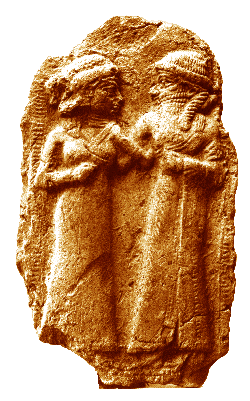This reminds me of the myth of Persephone, who was abducted by Hades into the underworld. The sumerian equivalent is Erishkigal and there is a relation to the story you mentioned.
Be warned that wikipedia is controlled by the enemy and not everything you read is accurate. It's best to go to primary or secondary sources if available.

en.m.wikipedia.org
This story seems to be describing the necessity of cleaning the soul and chakras, as well as balancing them. Inanna here could be seen as the yin or feminine principle of the soul. Dumuzid, her husband, could be the yang/masculine principle. If these two are not united and in harmony then disaster results. One must not be above or below the other.
The quote here describes "sexless beings" and another describes them as "transgender". They are neither. They are the Gala, the priests of Sumeria. "Sexless" is likely a corruption, because remember that people who write about these things and translate them are not spiritual people, and these things are overseen by the enemy, so spiritual connotations are thrown out or missing. Sexless should be interpreted as neither masculine nor feminine, but both, since they are in balance, unified, perfected, as one would expect from the priestly class.
This seems to be a better site than wikipedia:
The Sumerian poem, The Descent of Inanna (c. 1900-1600 BCE) chronicles the journey of Inanna, the great goddess and Queen of Heaven, from her realm in the sky, to earth, and down into the underworld...

www.worldhistory.org
There are themes of jealousy and betrayal here, which I believe reinforces the themes of imbalance between yin and yang within the soul.
Attempting to raise the kundalini with a dirty, imbalanced soul cannot succeed and can be damning. Inanna in this story tried this and needed to be revived by spiritual masters, the priests, and Enki. The seasons are allegories for polarity of the soul. The sushumna has been described as drifting from ida and pingala throughout the day, which is reflected in the periodic, rhythmic, closing of one nostril and opening of another.
The winter season is when it is in the ida, the summer is when it is in the pingala. The realm of the gods, "heaven" or olympus or etc, is always described as a lush and temperate paradise all year round, which alludes to fixation of the sushumna in a balanced and unified soul. There are layers of spiritual meaning in the myths.




